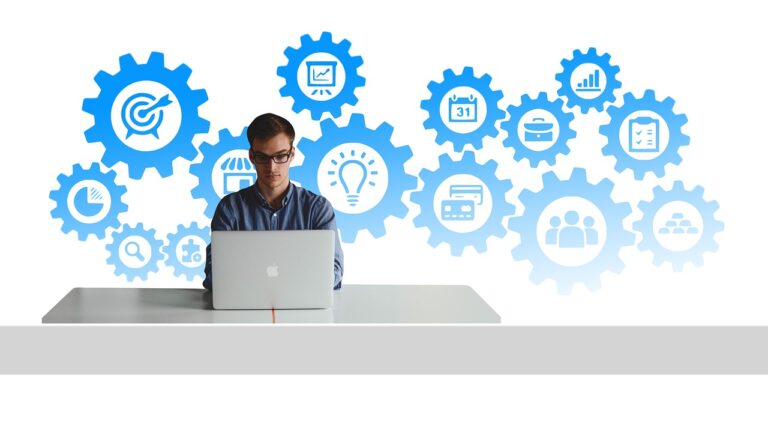Mindful Social Media Use: Cultivating a Healthy Relationship with Technology
Social media has become an integral part of modern daily life, offering a platform for connection and communication. However, excessive use of social media can have detrimental effects on an individual’s mental well-being. The constant exposure to curated versions of reality can lead to feelings of inadequacy and comparison, fostering a sense of insecurity and low self-esteem.
Moreover, spending excessive amounts of time on social media may result in decreased face-to-face interactions and a sense of isolation. The virtual world can sometimes replace real-life connections, leading to feelings of loneliness and disconnection from the world around us. As individuals immerse themselves in the online realm, they may neglect personal relationships and opportunities for authentic communication, impacting their overall emotional health.
Setting Boundaries for Healthy Screen Time
Setting boundaries for healthy screen time is crucial in today’s digital age. With the constant influx of notifications and updates, it’s easy to get drawn into the black hole of endless scrolling. Setting limits on the amount of time spent on social media and other online platforms can help prevent feelings of burnout and anxiety that are often associated with excessive screen time.
Establishing specific periods for screen use, such as designating certain hours of the day for checking social media or refraining from screens during meal times and before bedtime, can contribute to a more balanced and mindful approach to technology consumption. By being intentional about when and how we engage with screens, we can create space for other activities that promote mental well-being, such as exercise, hobbies, and face-to-face interactions with loved ones.
Recognizing Signs of Social Media Addiction
Social media addiction can manifest in various ways, often affecting one’s daily life and mental well-being. One common sign is the constant urge to check social media platforms, even in inappropriate or inconvenient situations. This behavior can lead to neglecting important responsibilities or obligations in favor of spending excessive time online.
Another red flag indicating social media addiction is experiencing withdrawal symptoms when unable to access social media. This can include feelings of anxiety, irritability, or restlessness when not able to engage with online platforms. Additionally, becoming defensive or in denial about the amount of time spent on social media despite concerns from friends or family members can also be a sign of addiction.
Practicing Digital Detoxes for Mental Well-being
In a world where we are constantly surrounded by screens and digital devices, taking the time to unplug and detox from technology is essential for our mental well-being. Engaging in activities such as spending time in nature, reading a book, or practicing mindfulness can help us recharge and reconnect with ourselves in a world that is often oversaturated with online interactions. By intentionally stepping away from screens, we give ourselves the opportunity to reflect, destress, and find a sense of calm in the midst of a fast-paced digital age.
When we prioritize digital detoxes, we create space for genuine human connections and meaningful experiences that go beyond the superficiality of social media. By disconnecting from the virtual world, we open ourselves up to more authentic interactions and moments that can enrich our lives in ways that constant screen time cannot. Taking regular breaks from technology allows us to be present in the moment, cultivate mindfulness, and foster a healthier relationship with both ourselves and the world around us.
Creating a Balanced Approach to Social Media Consumption
In today’s digital age, finding a balanced approach to social media consumption can greatly impact our overall well-being. It’s important to be mindful of the time spent scrolling through feeds and interacting online. Setting boundaries and consciously limiting screen time can help prevent feelings of overwhelm and digital fatigue.
Engaging with social media in a purposeful manner, rather than mindlessly scrolling, can lead to a more positive experience. Prioritizing real-life interactions and activities over virtual connections can foster deeper relationships and a stronger sense of presence in the moment. By taking a proactive approach to our social media usage, we can cultivate a healthier relationship with technology and enhance our mental and emotional health.
Building Real-Life Connections Beyond the Screen
In a digital age dominated by virtual interactions, the essence of real-life connections often fades into the background. However, nothing can truly replace the authenticity and depth of face-to-face human relationships. Building real-life connections should be a priority in our hyper-connected world, offering meaningful interactions that nurture our emotional well-being and foster a sense of belonging.
Stepping away from the screen and engaging in in-person conversations, outings, and activities can create bonds that transcend the confines of a digital interface. These real-life connections provide opportunities for genuine communication, empathy, and shared experiences that contribute to our overall happiness and fulfillment. Prioritizing real-life connections allows us to cultivate a support system, form lasting memories, and strengthen our sense of community, grounding us in the present moment and enriching our lives in ways that virtual interactions cannot replicate.
Understanding the Impact of Social Media on Mental Health
Social media has become an integral part of daily life for many individuals, offering platforms for connection, information sharing, and entertainment. However, excessive use of social media has been associated with various negative impacts on mental health. One common effect is the potential increase in feelings of loneliness and isolation due to the superficial nature of online interactions, which may not fully satisfy the human need for genuine social connection.
Moreover, the constant exposure to carefully curated posts and images on social media platforms can contribute to feelings of inadequacy and low self-esteem. Comparing one’s own life to the seemingly perfect lives portrayed by others online can lead to self-doubt and negative self-perception. Additionally, the addictive nature of social media, with its constant notifications and updates, can disrupt sleep patterns and exacerbate anxiety levels, further impacting mental well-being.
Exploring the Link Between Social Media Use and Self-Esteem
Social media has become an integral part of daily life for many individuals, with platforms offering avenues for communication, connection, and self-expression. However, the constant comparison to curated online personas can significantly impact one’s self-esteem. The tendency to present the highlight reels of life on social media can create unrealistic standards and foster feelings of inadequacy in users, leading to a decline in self-worth and confidence.
Moreover, the incessant validation-seeking behavior encouraged by likes, comments, and shares can create a cycle of seeking external approval for self-validation. This reliance on external validation can erode one’s sense of self-worth and blur the lines between self-esteem and the fluctuating metrics of online engagement. As individuals strive to maintain a favorable online presence, the pressure to conform to societal ideals portrayed on social media platforms can contribute to feelings of dissatisfaction and self-doubt.
Utilizing Technology for Productivity and Positive Engagement
Technology has become an integral part of our daily lives, offering numerous tools and resources to enhance productivity and foster positive engagement. From task management apps to communication platforms, technology provides us with the means to stay organized, connected, and efficient in our endeavors. By leveraging these digital resources effectively, individuals can streamline their workflow, collaborate effectively with others, and achieve their goals more efficiently.
Moreover, technology also opens up opportunities for personal growth and learning. Online courses, educational websites, and digital libraries offer a wealth of knowledge and information at our fingertips. By engaging with these resources, individuals can expand their skills, stay informed on current trends, and broaden their horizons. Embracing technology for productive purposes not only facilitates our day-to-day activities but also empowers us to continually learn and evolve in our personal and professional lives.
Finding Joy and Fulfillment Offline
Spending time offline allows individuals to engage in activities that bring genuine joy and fulfillment. When disconnecting from the digital world, people can fully immerse themselves in hobbies, such as painting, hiking, cooking, or reading a physical book. These offline pursuits not only provide a sense of accomplishment but also foster creativity and relaxation.
Moreover, investing time in face-to-face interactions with loved ones and friends can greatly enhance one’s well-being. Shared moments of laughter, support, and connection build stronger relationships and create lasting memories that cultivate happiness and contentment. By prioritizing offline experiences, individuals can achieve a sense of balance and find true joy in their lives beyond the confines of technology.
What are some negative effects of excessive social media use?
Excessive social media use has been linked to increased feelings of loneliness, decreased self-esteem, and a higher likelihood of experiencing anxiety and depression.
How can I set boundaries for healthy screen time?
Setting boundaries for healthy screen time involves establishing designated times for when you will use social media, limiting the amount of time spent scrolling through feeds, and prioritizing in-person interactions over online ones.
What are some signs of social media addiction?
Signs of social media addiction can include constantly checking social media accounts, feeling anxious when unable to access social media, neglecting real-life responsibilities in favor of online interactions, and experiencing withdrawal symptoms when not using social media.
How can I practice digital detoxes for mental well-being?
Practicing digital detoxes involves taking regular breaks from social media, setting specific periods of time where you refrain from using technology, engaging in activities that do not involve screens, and prioritizing self-care and mindfulness.
How can I build real-life connections beyond the screen?
Building real-life connections beyond the screen involves reaching out to friends and family members for in-person interactions, joining clubs or groups with shared interests, volunteering in your community, and participating in social activities that allow for face-to-face communication.
What is the impact of social media on mental health?
Social media has been shown to have both positive and negative impacts on mental health. While it can provide a sense of connection and support, excessive use can lead to feelings of inadequacy, loneliness, and anxiety.
How does social media use affect self-esteem?
Social media use can affect self-esteem by promoting unrealistic standards of beauty and success, triggering feelings of jealousy and comparison, and fostering a culture of constant validation through likes and comments.
How can I utilize technology for productivity and positive engagement?
You can utilize technology for productivity by using apps and tools to help you stay organized, set goals, and track your progress. Additionally, you can engage in positive online communities that support your interests and hobbies.
How can I find joy and fulfillment offline?
You can find joy and fulfillment offline by engaging in activities that bring you happiness and satisfaction, such as spending time with loved ones, pursuing hobbies and interests, practicing mindfulness and gratitude, and disconnecting from screens to fully immerse yourself in the present moment.







